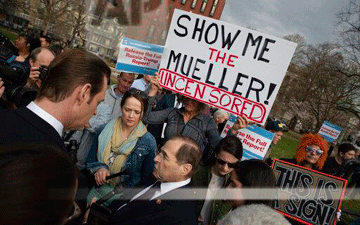
Sipa USA via AP
Subramaniam Vincent is leading projects for Journalism & Media Ethics at the Markkula Center for Applied Ethics at Santa Clara University. Views are his own.
Special Counsel Robert Mueller’s finding on “No collusion between the Trump campaign and Russia” is going to be debated and fought over. But not surprisingly, following Attorney General William Barr’s summary, there was criticism of the “mainstream media” for their coverage and calls for self-examination. One critique said there is too much opinion from commentators and anchors driving the news. Another critique went that too many journalists are appearing on TV and offering opinions. A third line was that the volume of coverage devoted to the Trump/Russia investigation by the “liberal” media was too much.
A question that needs some attention is the ethics of headlines. Headlines are both a microcosm and the shiny tip of narratives that readers see first as they browse their newsfeeds. One particular example is the “Walls closing in on Trump…” headline that made its rounds during 2018. This particular “sub-narrative” represents one subset of news and commentary that the media ran on the Mueller investigation as it progressed.
To get a glimpse of this, go to Google search. Type “Walls closing on Trump,” or “Mueller closing in on Trump,” and see the results. Click the News tab to see only News results if you like. If your reading profile is anything like mine -- you read a variety of different news sources -- overwhelmingly you’ll see that MSNBC, CNN and Yahoo News used this approach. (There were others.) All along MSNBC and CNN were predicting that Mueller would find against the Trump campaign on the collusion charge. (Note: This list is not exhaustive, just illustrative.)
|
Narratives are how the public takes in the media’s ongoing content cycles. The Oxford dictionary defines narrative as, “A representation of a particular situation or process in such a way as to reflect or conform to an overarching set of aims or values.” “Narratives are pathways along which you tell your stories,” says Bryan Stevenson, author of Just Mercy, in a recent podcast. The “pathways” term is important here, because once we have set out along a path, we are unlikely to see things emerging on other paths. |
Is using a headline like, “Walls closing in On Trump,” when the Mueller investigation had not concluded, ethical? At the very least it poses a dilemma since it does not appear straightforward. How does an editor make such a decision? This question is rarely asked.
The Framework for Ethical Decision Making from the Markkula Center for Applied Ethics calls for a step-by-step approach
- Recognize an ethical issue
- Get the facts
- Evaluate alternative actions
- Make a decision and test it
- Act and reflect on the outcome
(For this article, we will only need steps 1-3)
Before we unpack this, let’s lean in favor of the mainstream media, just for a moment.
- Mueller’s investigation, already acknowledged as one the fastest in American history, was rapidly piling up indictments.
- Cohen’s guilty plea about lying to Congress on Russia contacts only added to the suspicion of collusion.
- The President’s behavior at the press conference at the Helsinki summit with the Russian President standing by his side was a worrisome signal.
- There was plenty of lying by people in his campaign about Russia contacts and resultant indictments.
So suspicion in and of itself was not surprising. But the quality of evidence needed to suspect someone of collusion is very different from what it takes to pass legal standards for criminal prosecution. Journalists know this, TV anchors also know this, and lawyers know this all too well.
Let’s consider the dilemma using the Framework for Ethical Decision Making, focusing on steps 1-3.
1. Recognize an ethical issue. The normative question here is that suspicion notwithstanding, should a section of the media have been predicting at all that Trump and members of his family were going to be indicted? Is it the news media’s role through journalism to do so? That this question arises itself implies editorial decisions could go either way, and any quick jump to conclusion is likely to be biased.
2. Get the facts. Journalists were aware of a set of facts emerging from the investigation and their own investigations. Did they know that Mueller had gotten enough criminally prosecutable evidence to indict members of the Trump campaign or family for collusion? If they knew, and they had verified this, that would be the story. At the time they ran with “Walls closing in …,” they did not.
3. Evaluate alternative actions.
Option 1: Use “Walls closing in ...”
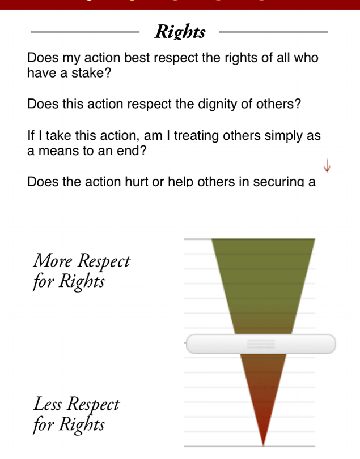
- Rights: Does this headline best respect the rights of all those who have a stake, i.e. the readers. Does it respect the dignity of others? If as an editor, I take this action, am I simply treating others as a means to an end? On this count, “Walls closing in ...,” assumes readers of a certain ideological frame, or strongly critical of the presidency, will “like” it and engage with the story more as an audience. That works for the monetization goal, which the readers are a means to an end. It does not respect their rights as citizens to be informed.
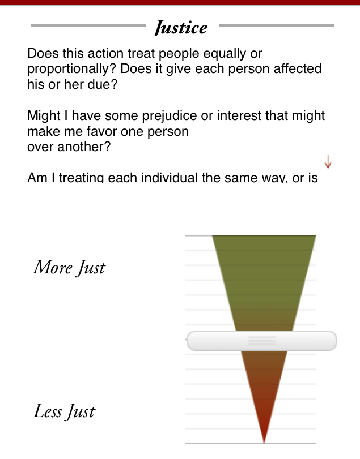
- Justice: Does this action treat people equally or proportionally? Might I have some interest or prejudice that might make me favor one person over another? Here too, “Walls Closing In …,” is implicated with a low score. When anchors and commentators drive their theories ahead of legal proceedings, they run afoul of the justice standard. This is often called “trial by media.” This further undermines public confidence in the outcomes which could further contribute to distrust or deepen it. This hurts the common good too, which comes next.
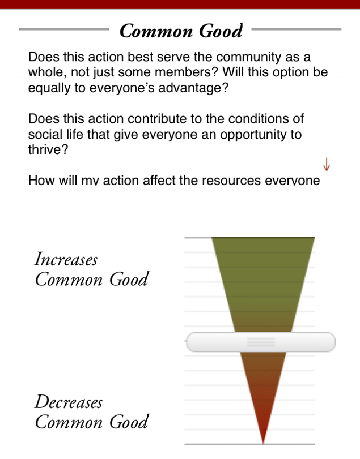
- Common Good: Does this action best serve the community as a whole, not just some members? Does it contribute to the conditions of social life that give everyone an opportunity to thrive? If you were a conservative, and even if you did not support this presidency, you would see this headline and narrative as “liberal bias” and become further skeptical of the media. I would assert that this contributes to news media-led polarization, and is already showing up in skirmishes on the streets. Journalism is supposed to serve the common good. So this headline will score low by this standard too.
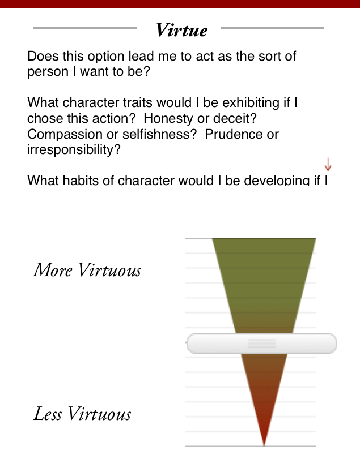
- Virtue: What character traits would I be exhibiting if I chose this action? Honesty or deceit? Compassion or selfishness? Prudence or irresponsibility? “Walls closing in ...” is not driven by facts as we called out earlier. It is not an honest representation of reality to the reader. It scores low on this standard too.
Option 2: Use any other factual headline. Any other headline would have simply captured what was going on without spinning the prediction about the outcome of the investigation. Editors have many choices depending on what else was being said in the particular article. All the reporting from the news media were conveying the sense that indictments were continuing and guilty pleas piling up.
4./5. Make a decision and test it. Reflect on the outcome. We’ll skip these two steps for brevity since the focus of this piece is evaluation using ethical standards.
Interestingly, Washington Post, New York Times, and New Yorker did not take the “Walls closing in ...” approach, despite their substantive watchdogging of the Trump presidency. If you are a little more intrigued, read Eric Wemple’s carefully written piece, If Trump’s ‘walls are closing in,’ they’re moving very slowly, in the Washington Post, challenging this narrative. Wemple’s collection of posts over two years is more useful than what you will find via a Google search.
But, wait. What if the Mueller investigation had found that the Trump campaign had colluded with Russia? In that case, Sunday, March 24th, 2019, would just have been another day. It would not have changed anything in our analysis. The headline choice would still have been unethical. If headlines and narratives were explicitly considered in newsrooms and deliberated using some ethical framework, “Walls Closing In” on collusion would not have run.
“I would not have gone in with the ‘Walls closing in on Trump’ headline,” says Theodore Glasser, renowned professor of journalism at Stanford University. “This is a distraction from the main narrative of wrongdoing that the press is reporting on,” adds Glasser, while also pointing out that he is fully supportive of the media’s extensive watchdogging of the Trump Presidency.
In sum, “Walls closing in …” was a constructed narrative, and was running ahead of the truth. Some of the mainstream media were using it to predict someone’s indictment while a grand jury investigation was ongoing. MSNBC and CNN appeared to be counting on Mueller finding that Trump colluded.
Anita Varma contributed inputs to this article.
References
- Media takes serious hit from Mueller conclusions, The Hill. “The breathless coverage amplified the sense that Trump and some of his family members would go down for crimes, yet in the end, Mueller reported that he found no evidence of a conspiracy”, says Jonathan Easley in this piece.
- Perception of Bias: The Media and Mueller Report, QuillMag (Society of Professional Journalists)
- The Critical Part of Mueller’s Report That Barr Didn’t Mention, The Atlantic.
